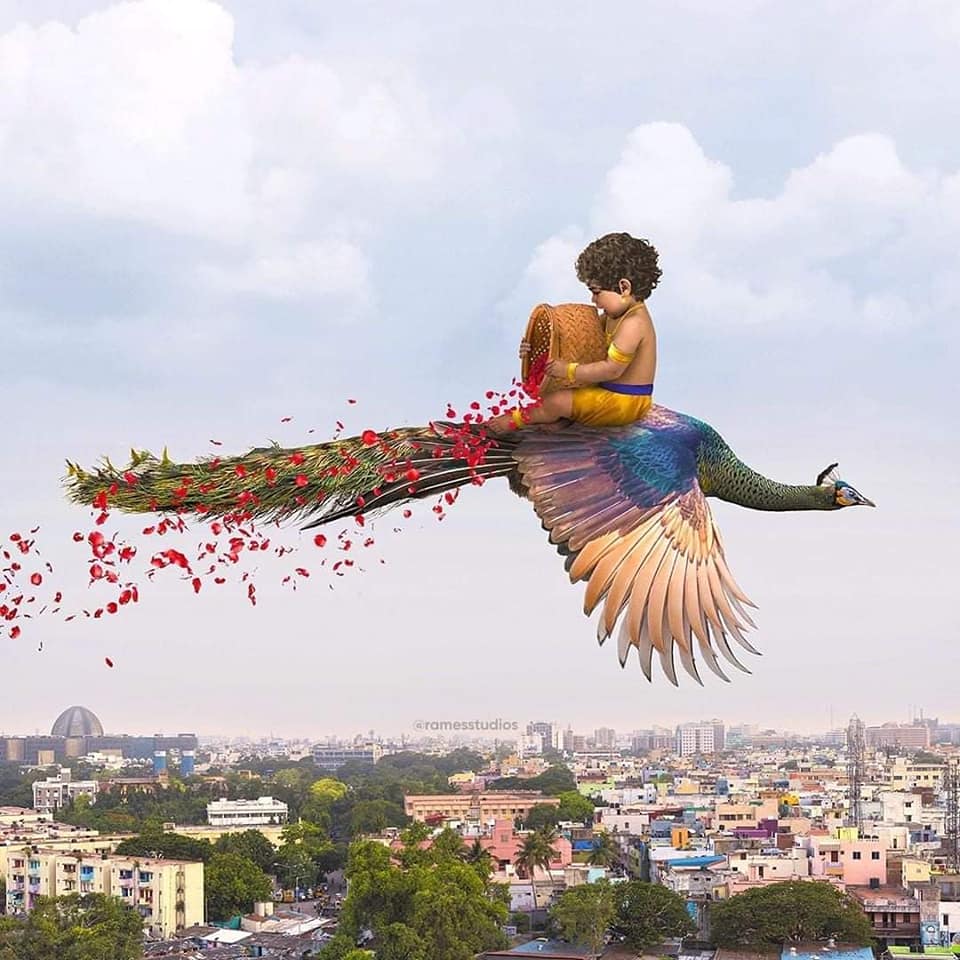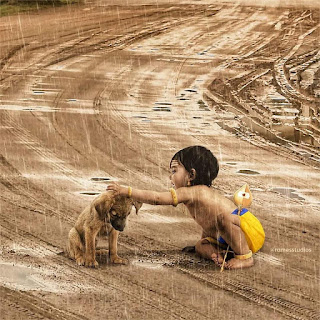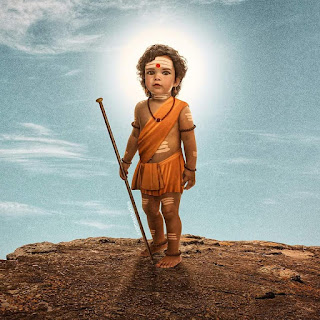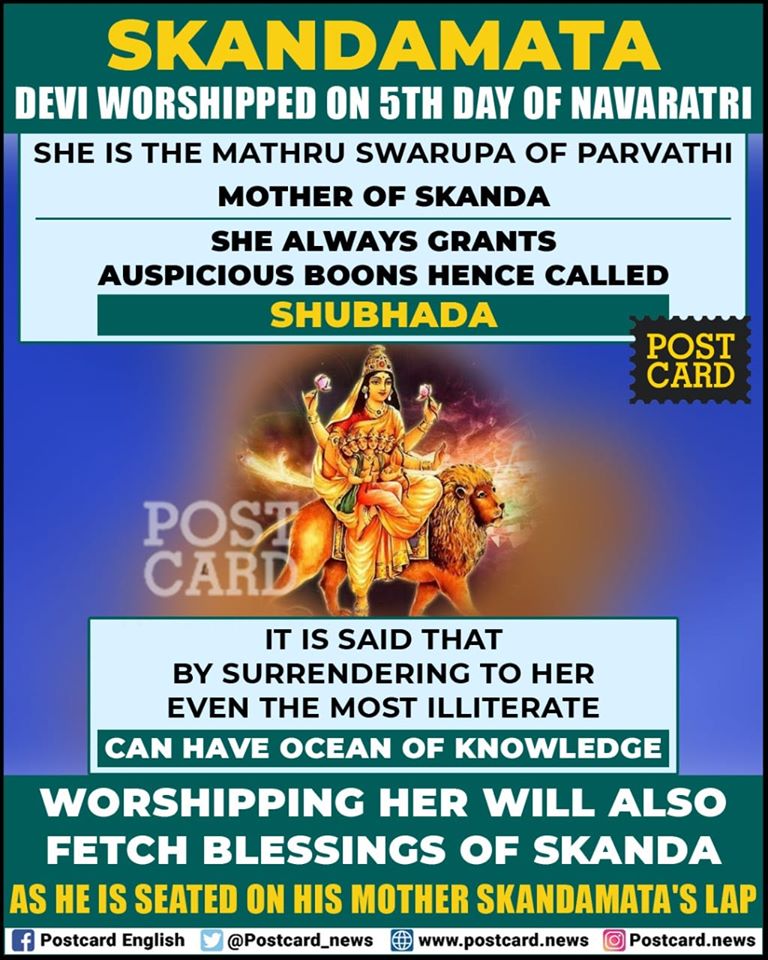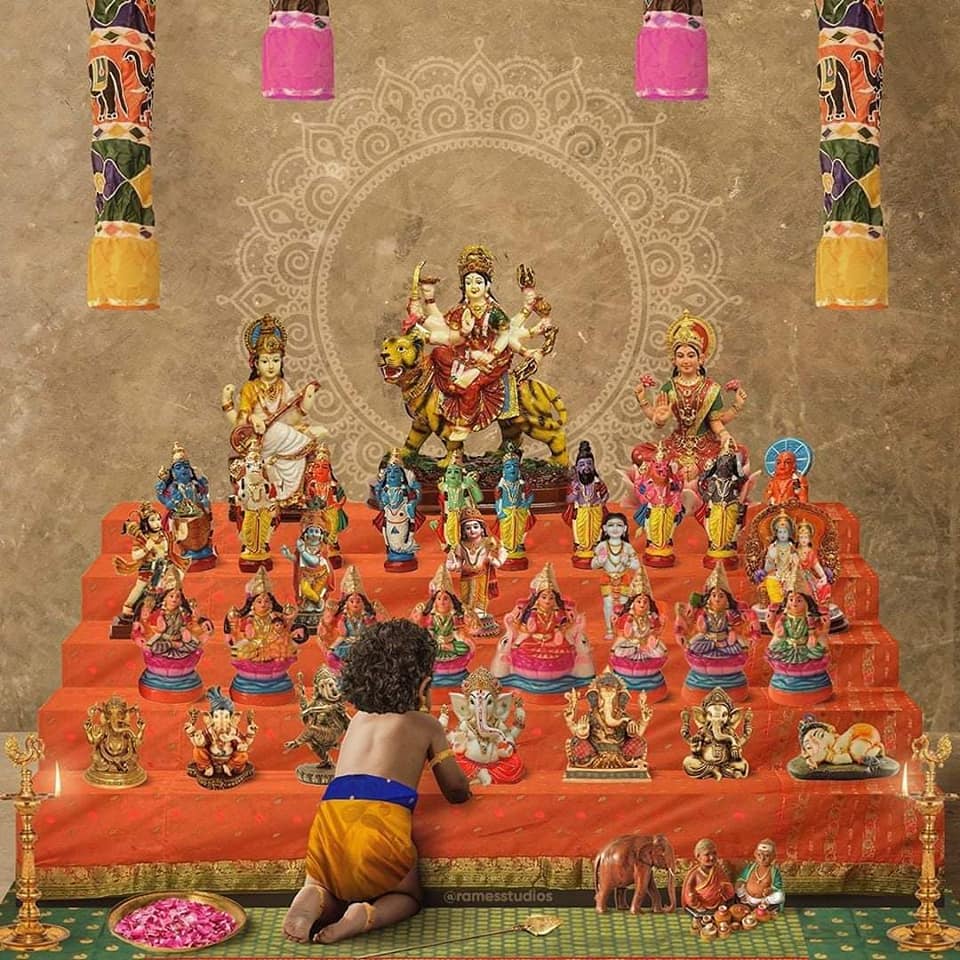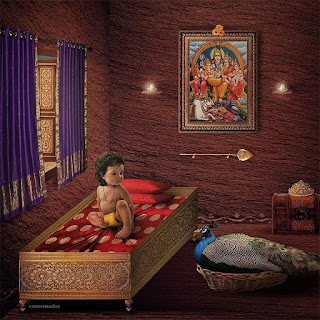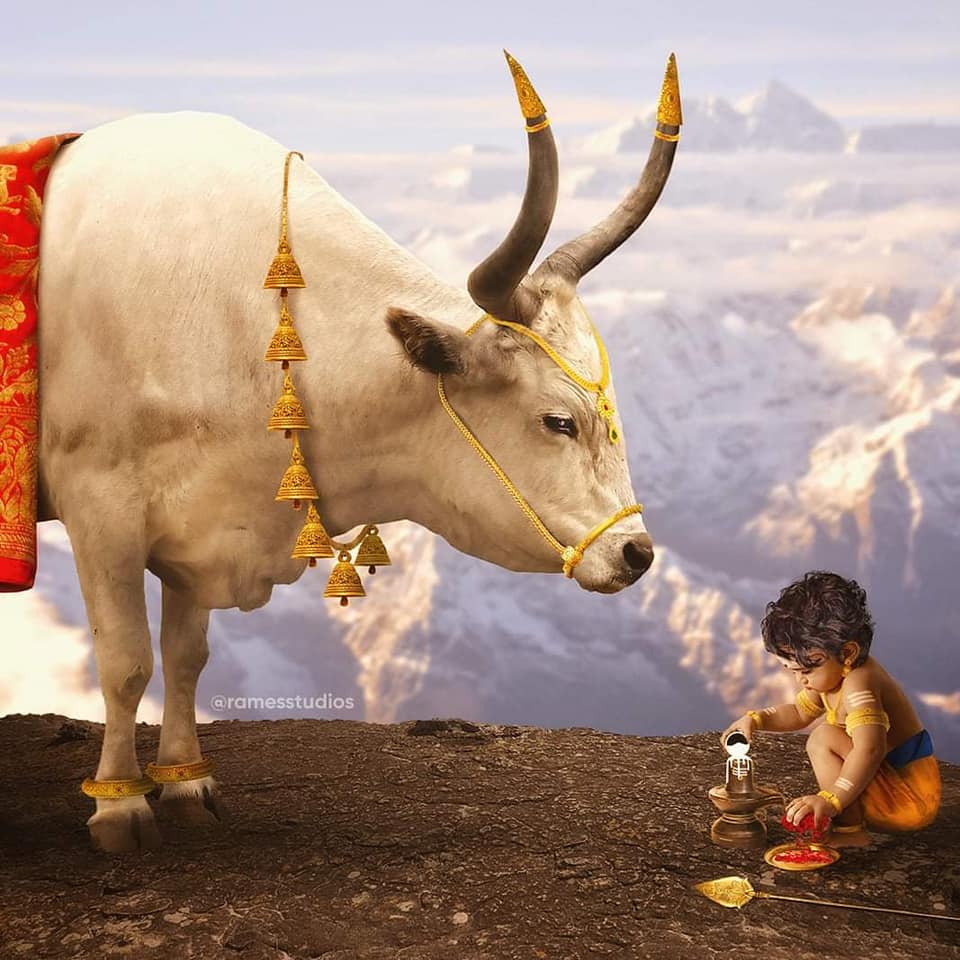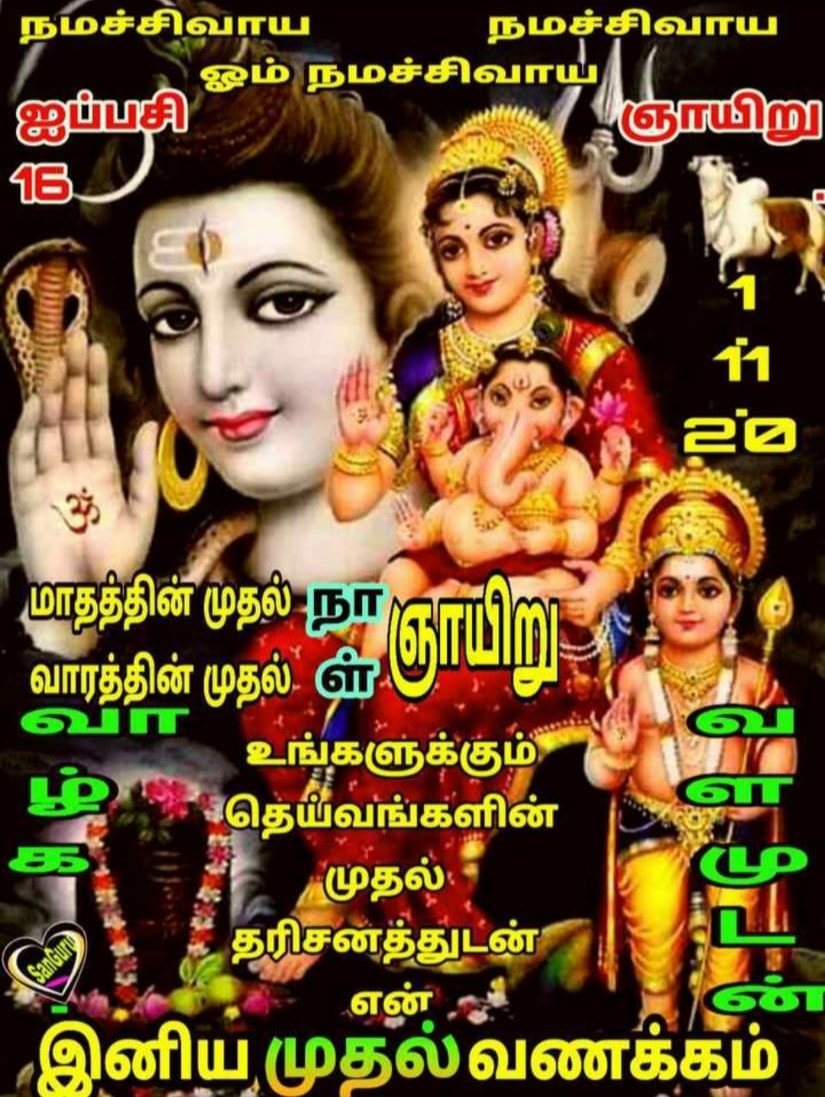Followers

Wednesday, November 25, 2020
Nandi
Daksha Yajna
Brahma had a son by name Daksha. On hearing from his father about the immense benefits of doing Tapas, Daksha went to the mountains and did rigorous Tapas on Lord Siva. Much pleased with his penance, Lord Siva granted him many boons. By these, Daksha became the king of the Devas and the three worlds. Also, he was the most fortunate recipient of another boon, viz., that Sri Parvati herself was to be his daughter.
In one of the discussions between Lord Siva and Parvati, the latter asserted herself very much and gave herself airs of too much self-importance. As a corrective to this bumptiousness, she was ordained to take a human birth and return later on to Mount Kailasa. Parvati Devi came down to earth and was lying as a child in a tank. While wandering in the forest, king Daksha saw this child in the lotus pond, took her home and brought her up as his own daughter. She was known as Dakshayani and, as the years grew, she cultivated extreme devotion for Lord Siva; and expressed her resolve to marry only Lord Siva. Daksha was highly pleased.
Lord Siva in the guise of a hunter met Dakshayani alone, and assured her that He would marry her very soon. On hearing the news, the girl’s parents made arrangements to celebrate the marriage in a grand and befitting manner. But Lord Siva, instead of undergoing the prescribed ceremonies of marriage, entered the wedding hall abruptly and carried away Dakshayani in the presence of Daksha and other Devas who had assembled there to grace the occasion. This action of Lord Siva infuriated Daksha, and, forgetting all that He had done for him and the greatness of the Lord, Daksha began abusing Siva and belittling His Lilas.
Daksha had 27 daughters whom he had given in marriage to Chandra (moon-god). Chandra, instead of loving all the 27 wives equally, developed an intense partiality towards Rohini. Resentful of this action of Chandra, the other wives went and complained to their father, Daksha, about the partiality of Chandra. Daksha, on hearing this report from his dear daughters, cursed Chandra to be deprived of his Kalas (brightness). Much grieved and depressed at heart, Chandra at last made his way to Lord Siva and prayed to be saved from the curse of Daksha. And the Lord, out of compassion, retrieved him partially from the curse and saved him by wearing him on His own forehead. Hence we find changes in the phases of the Moon—gradual decrease of brightness during Krishna Paksha or the dark fortnight, and gradual increase during the Sukla Paksha or the bright fortnight. This action of Lord Siva further infuriated Daksha.
Lord Brahma had arranged for the performance of a Yajna and, as usual, to offer the sacraments of the Yajna to Lord Siva, the Lord of all Yajnas. Invitations were sent to all Devas as well as to Daksha. The whole host of Devas had assembled in the Yajna hall. Lord Siva had sent Nandi to attend the function and represent Him during the Yajna. Daksha, who also attended the Yajna, was filled with such envy and pride that he not only condemned Brahma for giving the sacrament to Siva but also went to the extent of blaspheming Lord Siva and treating His representative, Nandi, in the most contemptuous manner.
None of the Devas witnessing this behaviour of Daksha had the courage to protest. But Nandi was touched to the quick. Enraged much at the words of Daksha, Nandi cursed him to suffer in various ways and die a violent death, and to have a goat’s head in his next birth. He also berated the Devas for their indifference, if not cowardliness, in not admonishing Daksha for his blasphemy and cursed them to undergo torture and persecution at the hands of the Asuras Surapadma, Simhamukha and Taraka. With this Nandi left the hall in a rage.
After the departure of Nandi, the great sage and seer, Dadheechi Maharshi, approached Daksha and advised him not to act in that manner towards Lord Siva. He brought home to Daksha the various acts of compassion of Lord Siva and His Lilas. The sage entreated him to be more devotional to Him and leave off such haughtiness of spirit. But all in vain. At last Daksha decided to perform a Yajna in which he would neither invite Lord Siva nor offer the sacrament to Him.
At Kankhal (in Hardwar), on the banks of the Ganga, arrangements were made for the grand Yajna of Daksha. All the Devas were invited. Large scale arrangements had been made for receiving the visitors to the Yajnashala. Lord Siva alone was left uninvited. Dakshayani, who was at the time with Lord Siva at Kailasa, heard the news of the Grand Yajna of her father. Against the wishes of her Lord, Dakshayani, tempted by her keen and natural desire to attend the great function, hurried up to Kankhal, where the Yajna was in progress.
There was none to welcome her at her father’s residence. And worse still, she was openly insulted by her father and his party. News of this ill-treatment meted out to Dakshayani reached Lord Siva. He summoned god Veerabhadra and ordered him to make a clean sweep of the Yajna and the participants thereof. Veerabhadra rushed to the spot in great fury and dashed to pieces all the grand arrangements made for the Yajna; and almost all the participants fell a prey to his unbounded ire. Those who begged pardon of him were let off. While this work of destruction was going on, Lord Siva appeared before the Devas. At the request of Dakshayani, Siva brought back all the dead to life. After sometime, on the advice of Lord Brahma, his father, Daksha went to Varanasi to do Tapas for the grace of Lord Siva. Lord Siva appeared before Daksha and made him one of the leaders of His Bhuta Ganas.
The Curse of Nandi
Akhirasena, the king of the Asuras, had a daughter Surasai by name. To avenge the defeat of the Asuras at the hands of the Devas, Sukracharya, the Asura Guru, taught Surasai all the Arts of Maya. Surasai became an adept in those Arts, and was herself aptly called Maya. To bring back the lost glory of the Asuras, Maya determined to beget children through a great sage, so that the descendants could be more powerful than the Devas. With this in view, she approached the place where Kasyapa Rishi was doing rigorous Tapas.
By her magic spells she created a beautiful garden in the forest; and there she was, dancing and enjoying herself as part of the beauty of Nature. Disturbed by this interference, Kasyapa woke up from his meditation and saw a beautiful lady before him. By the secret powers of Maya, the Rishi fell victim to her charms and easily yielded to her proposals. Both the Rishi and Maya spent happy days together, roaming about gaily in the forest. Maya bore three sons and a daughter to the Rishi. The first son was Surapadma, the second Simhamukha and the third Tarakasura. The daughter’s name was Ajamukhi. Of the sons, Simhamukha had a lion’s face and Tarakasura an elephant’s; and Ajamukhi had the face of a goat. Along with them there arose a huge army of Asuras to help these leaders in their oncoming fight with the Devas.
Surapadma and his brothers, while they were yet young, requested their father and mother to prepare them for a life of glory and victory. Kasyapa Rishi told them to lead a virtuous life and do rigorous Tapas with intense devotion to the Lord. He cited the story of Markandeya to show how the power of his devotion to Lord Siva had protected him even from the grip of Lord Yama.
But Maya, mindful of her mission, was not satisfied with this advice to her sons. She entreated her sons to do rigorous Tapas on Lord Siva and to obtain boons by which they could have suzerainty over the Devas and live happily and gloriously.
After some time, Kasyapa realised his folly in having allowed himself to become a victim to the wiles of Maya and left them all and went his own way. As advised by their mother, Surapadma and his brothers proceeded north to perform intense Tapas. After making every arrangement carefully for the performance of their penance, they commenced their Tapas. Years passed. They obtained no results. Hence Surapadma and his brothers doubled their austerities, cut off every limb of their body and threw them one after another as an offering into the sacrificial fire before them. Even then Lord Siva did not appear. Finally Surapadma offered himself in the fire and died. The other brothers were also preparing themselves for a similar sacrifice when Lord Siva appeared before them, brought Surapadma back to life and granted a number of boons prayed for by them.
Having thus achieved their aims, they came back triumphantly to their mother who gladly welcomed them home. Maya sent them to Sukracharya, the Asura Guru, for further advice and guidance. Sukracharya gave them detailed instruction for leading an extremely sensuous life of pomp and glory. He addressed them thus: “When people say ‘everything is done by the one Supreme Being and He dwells everywhere,’ they are telling a stupendous lie. The Lord has created all other creatures and plants simply for man’s enjoyment. Might is Right. No one will derive any pleasure by acting upto the high-sounding precepts like ‘Do always good, avoid evil things.’
“The so-called Lord’s Lilas are just like the places and persons we experience during a dream. Everyone is the same in the creation of the Lord. To favour some as saints and sages and condemn others as ignoramuses and sinners is nothing but injustice and partiality. As the Lord has granted you all the boons you desired, it is up to you to utilise them in the proper way. You have got immense power now. You can do and undo things. Hence start at once on the mission of your life for which your mother Maya has been yearning so much. Fight against the Devas. Overthrow them from their power. Strip them of their riches and glory. Lord it over them. Make them your slaves.
“Live a life of ease and pleasure, using every object you could conceive of for your sensual enjoyment. Eat, drink and be merry. Live gloriously. Extend your sway over all the worlds created by Lord Siva. You should reign not only over them, but also establish your dynasty to rule over everyone for generations to come. Thus you will restore the glory now lost to the Asura dynasty.” In these thrilling and perverse words Sukracharya instructed Surapadma, Simhamukha and Tarakasura.
After having received the benedictions and final exhortations of their Guru Maharaj, Surapadma and his brothers began their career of conquest over the Devas. Surapadma established his capital at Mahendrapuri, in the South. Simhamukha had his capital in Asuram, in the North. Tarakasura built his capital near Emakoodam. These cities were duly planned and perfected by the divine architect, Visvakarma. The three brothers had their own independent kingdoms established around their capitals and were reigning over them, to the terror and dismay of the Devas.
Not satisfied with the vast kingdoms allotted to them, the brothers then proceeded to the habitation of the Devas to deprive them of their sovereignty and freedom. Surapadma invaded Indraloka, took Indra prisoner and made him work as a fisherman in the capital! Brahma was asked to officiate as the Purohit. Vayu, the god of wind, was appointed as the sweeper of the streets of his capital; to Varuna, the god of rain, was assigned the task of sprinkling gentle drops of water over the streets to lay the dust; the Sun was given to his son, Banukopan, as a toy to play with; Lord Vishnu alone was left undisturbed. In this way Surapadma, along with his brothers, subjected the Devas to every kind of ignoble persecution and insult. These privations and dishonour they had to undergo as a punishment for cowardly indifference they showed when Daksha blasphemed Lord Siva. The curse of Nandi had come home.
Saturday, November 14, 2020
Kattabomman
There is no equal to the devotion that Veerapandiya Kattapomman had on Lord Muruga.
Murugan has done some miracles through Kattapomman to recognize the appreciation of his devotee.
Kattapomman used to eat his lunch daily after completing pooja and nivethanam to Lord Muruga in Thiruchendur.
Is the fort of Kattapomman in Panchalang Kurichi. Thiruchendur Murugan temple is so far away from here.
To let Murugan know that Nivethanam has happened in the temple.........
He built stone halls from Tiruchendur to Panchalangkurichi. He installed bronze beads inside the hall.
Stopped the servants in every hall.
It is a habit to start ringing the Thiruchendur temple tower bell as soon as the top time pooja is done in Thiruchendur.
Following this, the next hall will hear the bells.
For this, Kattabomman had a Mani Mandapam in many places including Arumuganeri, Aathur, Ottapidaram, Panchalangkurichi.
The servant in the hall will immediately unleash the wrist of the hall and raise the bells.
In this way, the bell will ring in every hall and at the end the bell will ring in the Panchalangkurichi Mandapam
(Some of these halls can still be seen in this way) )
Moreover, every Monday early morning horsemen will bring leaf vibhuti prasad from Thiruchendur Murugan temple to Kattapomman and give it to Kattapomman.
Kattabomman will start his daily tasks only after getting Vibhuti in his hands.
One bell would have been hung on the seventh stage of the Thiruchendur Murugan temple tower.
This was set up by Kattapomman. This has been without sounding for years.
By the bell roaring from this tower, they will make the next bell ring and indicate that Murugan has become a relief.
This bell which was not working was re-ringed during the temple consecration. Now this bell is ringing in the peak puja.
And because of his devotion to Lord Muruga, Kattapomman also had the habit of sending thousands of fortresses to Nellai to donate food from his paddy barns to Thiruchendur Murugan temple.
Citizens also brought the process of carrying paddy from their fields as saffron and giving it to the temple.
Once upon a time, Kattabomman wanted to gift a gold necklace to his wife and asked the golden killer to prepare it.
Murugan who appeared in his dream that night, you could have given me that necklace? He said it.
As soon as the necklace was ready, he took it and wore it to Murugan in Thiruchendur temple.
Once again, Masi festival was going on in Thiruchendur.
The chariot is ready for the chariot ride. Kattapomman should come and give him the cord. I don't know why I couldn't come
Well, we can pull the chariot, devotees dragged the chariot. The chariot just rolled a little distance. It has stopped moving anymore.
The wheel of the chariot is standing in one place. The car did not move even after many devotees tried.
Meanwhile, Kattapomman was brought a message and he also arrived here.
Kattabomman caught about the chariot. Immediately the chariot moved. Murugan has appreciated his devotion through Kattapomman with many miracles like this.
There is a beautiful village called Muthalangkurichi on the bank of Tamirabarani river.
A poet named Kavirayar Kandasamy Pulavar lived here.
He is also a very intense devotee of Lord Muruga. He has no vision in both eyes.
Lord Muruga will come in person to listen to his song! So much love for his song.
One day the poet was singing a poet. I had the habit of throwing the victory.
While chewing the victory of the poet, the saliva fell on the parivattam of Lord Muruga.
It was seen in the Moolavar Parivattam in Moolasthanam, Thiruchendur.
Butter was nervous when he saw this. He was heartbroken without knowing how this happened.
Murugan appeared in the dream of Butter that night and said, ' Oh my god, the one who has deep devotion on me is the poet of Muthalangkurichi.
He is also blind. I have decided to give him a visit.
Every last Friday of every month, He walks to see me.
Call him and take a flower from the garland that is worn for me and accept it in his eye!
Then he can see in that eye. Lord Muruga will ask you when will he open the other eye.
Tell him to go to Panchalangkurichi. There my devotee Kattabomman said that he will open another eye for him and went away.
The poet who came to Thiruchendur next Friday took bath in the sea. Butter found him and brought him to Murugan temple.
As per the order of Lord Muruga, he took a flower and put it in the eyes of the poet.
Kavirayar got a glimpse in his eyes. To get another eye's sight, you go to Panchalang. This is the order of Lord Muruga, Butter said.
According to this, the poet went to Panchalangkurichi. Kattabomman was amazed after knowing the details from the poet.
Did Murugan send me to open the other eye? He was amazed to hear that.
Immediately he arranged pooja at Jakkammal temple. Then he took the poet in one hand and entered the temple with a sword in the other hand.
Kavirayar was shocked to see the condition of Kattapomman with Uruvi sword.
What is this? Are you coming into the temple with a formed sword? He thought and heard that. There should be no lack of anger for the poet!, Similarly, he also asked.
The poet is worried that he is destroying the sanctity of the temple. But, Kattabomman did not speak anything, he took a flower from the garland that was worn to Jakkamma Devi and put it in the other eye of the poet.
What a surprise! That eye also got sight in the other eye!
Though the poet was happy, he was again angry because of Kattapomman's disorder. ' You are an arrogant man. That is why he said that even in the temple of the Goddess, you are standing with the sword formed in the power of power.
The person who said that I don't want this look that I got because of you who insults the goddess, tried to pluck the sword of Kattapomman and pierce it in his eye.
Kattapomman stopped the poet's hand. Dear poet, I did not hold the sword with arrogance. If I could not see you as per the order of Lord Muruga, I was with the sword that was created to stab me with this sword and kill me, he said calmly.
The poet just got stunned. ′′ What's up? Did you want to kill your own life! You are the best devotee of Lord Muruga! I'm sorry kattapomma! He said with tears in his eyes, ′′ Forgive me
At that time, Lord Muruga's Azeri was heard. Dear poet, if I want to give you a vision, I have performed this play to make you realize that the Pattar and Kattapomman who gave a vision in Muthalangkurichi were born to do my duties.
Kavirayar and Kattapomman became close friends after this incident.
When Kattapomman came to Muthalangkurichi to see the poet, the place where he parked the horse on the banks of the Tamirabarani river is still called * Veerapandiyan Kasam
Eesan, who was a Mukhilvannanathar in the temple there till then, was also known as Veerapandeeshwar.
Now Veerapandiya Kasam has become small!
The festival worships created by Kattapomman are being conducted in Thiruchendur temple by his heirs even today.
Wednesday, November 11, 2020
Tuesday, November 10, 2020
Mohanastra
On hearing from Veerabahu that the Asuras were ready for the fight, Lord Karttik shifted His army camp from Tiruchendur to Emakudam, very near the city of the Asuras, Mahendrapuri. News of this soon reached Surapadma, and he at once despatched a battalion to drive away the enemy from the outskirts of the city.
Banukopan, the eldest son of Surapadma, who had been given command of the battalion for the fight on the first day sallied forth and found the whole host of the army of the Devas arrayed against him. The grim fight between the two mighty armies then began. The Devas suffered very heavy casualties at the hands of Banukopan and his battalion. Leaders like Veerabahu and his brothers were laid low and in a dead faint by the secret Astras of Banukopan.
On receipt of news of how day was going against the Devas, the Lord sent his Mohanastra to cover the whole army of the Asuras, and all the warriors who had been killed or thrown into a swoon by Banukopan were restored. The Astra sent by the Lord winged its way in the meanwhile towards Banukopan. Realising the gravity of the situation, the young chief with the help of Maya, his grandmother, disappeared from the field unnoticed and made his way to the palace, where he acquainted his father, Surapadma, with the latest phase of the fight. The redoubtable chief of the Asuras himself took over the command on the second day.
Enraged at the discomfiture of Banukopan and determined to crush the army of the Devas once for all, Surapadma himself gave battle to the Devas and began to work havoc on them. Ugran, one of the leaders of the Bhutaganas (on the side of Devas) after an arduous fight killed Atisuran, the son of Simhamukha. Roused to a high pitch of fury at this set-back, Asurendra, son of Taraka, threw himself into the thick of the fight and sent celebrated leaders like Kanakan, Unmathan, Manthan and many other flying from the field.
Veerabahu Devar hurried to that wing of the army and soon found himself in a hand to hand sword fight with the dreaded Asura prince, Asurendra. Their grim fight seemed endless, victory leaning now to one side and then to the other, alternately. But Veerabahu Devar by the exercise of his utmost powers at last succeeded in killing Asurendra. This brought Surapadma himself into the active fight and, by the exertion of his supreme valour, he soon made short work of the eight brothers of Veerabahu Devar, who immediately engaged him in deadly combat. After a prolonged and sanguinary engagement, Surapadma realised the mettle of the opponent he had to deal with and directed his special Danda against him. The Danda struck Veerabahu on the chest and laid him out bleeding and unconscious. The fall of Veerabahu encouraged Surapadma and he chased the remnants of the demoralised Deva army out of the field.
Lord Shanmukha now emerged to the front and faced the triumphant Asura king. He began with a series of missiles which promptly shattered, one by one, all the weapons and insignia of Surapadma and his followers. Then He despatched His Chakrayudha which annihilated hundreds of thousands of the Asura army. Finding the ordinary arrows to be of no avail against his formidable foe, Surapadma took up the Pasupatastra which he had received as a boon from Lord Siva, and directed it at Lord Shanmukha, confidently expecting his enemy to fall immediately, as the wonderful and mighty Astra had never been known to fail before. To his consternation and terror, however, Lord Shanmukha calmly took hold of the Astra and kept it aside. Now realising in a measure the valour and greatness of Shanmukha, who could handle such an Astra in such a manner, Surapadma, taking recourse to his powers of Maya suddenly disappeared from the battlefield unseen and retired to his palace.
The next day, being the third day of the battle, Banukopan equipped himself for the fight with special care and made his appearance in the field. At the very outset Veerabahu and Banukopan confronted each other. And both realised that the contest was to be a fight to the finish. To free himself completely from this grim encounter, Banukopan, in the flash of a moment and with the swiftness of a hurricane, sent out his Mohanastra against the Devas; and the whole host of the leaders were rendered unconscious and dropped into the sea! It was a critical moment. But Shanmukha was more than equal to the emergency. He directed his Vel to bring back safe and sound all the discomfited leaders; and to the dismay of the Asuras, all those who were thought to have been sent to their certain doom were again seen soon afterwards stationed and arrayed against the Asuras as if nothing had happened!
Malainindra Thirukumara
Emakudam
Asuras
1 Surapadma who took the form of tree,
2 Simhamukha who swalllowed the deva army
3 Taaraka who faught with Divine Weapons
4 Asura Krauncha (who attacked him in the form of a mountain)
https://www.google.com/search?q=Sooranporu
Friday, November 6, 2020
Sunday, November 1, 2020
Labels
- 1000 (1)
- 1008 (1)
- 1008Worlds (1)
- 12 abs (1)
- 12 Weapons (1)
- 146 (1)
- 16 / 108 Names (Shodasa / Ashtottara Shata) (1)
- 16 types of Dheeparthana (1)
- 28AgamasLingas (1)
- 36 (1)
- 3d (1)
- 5 Shiva temples associated with Skanda Purana. (1)
- 50 (1)
- 54 Murugan Temples / Map (1)
- 6 Mukhi Rudraksha / Mantra / Points (1)
- 60 (1)
- A snake found near Kukke Subrahmanya temple with 5 heads (1)
- Aadiargal (1)
- Aarupadai (1)
- Aaryan (1)
- Aathichoodi (1)
- Aayirathil Oruvan (1)
- Acyutananda Incarnation (1)
- Adimai (1)
- Aghora (1)
- Agni Natchathiram (1)
- Ajamukhi (1)
- ajith (1)
- alai (1)
- Alangaram (1)
- Alphabets (1)
- Amaithi Kodupavar (1)
- Amar Chitra Katha (1)
- anandhinatarajan (1)
- andiappan (1)
- Ani (1)
- Animation (1)
- Anthologies (1)
- Antony (1)
- Anubhoothi (1)
- Anuboothi (1)
- apamnapat (1)
- Apps (1)
- Apsaraeeshwara (1)
- archgate (1)
- aries (1)
- Arjuna (1)
- Army of Murugan (1)
- Arohara (1)
- Art of Living (1)
- artofliving (1)
- Arunachala (1)
- Arunagirinathar (1)
- ArupadaiVeeduChennai (1)
- Asan (1)
- ashanam (1)
- ashram (1)
- Astrology (1)
- astroulagam (1)
- Asuras (1)
- Audio collection by singers and groups (1)
- AUM (1)
- australia (1)
- Avinankudi (1)
- Avvaiyar (1)
- Ayakudi (1)
- Azhagendra Sollukku Muruga by TMS (1)
- Baba Balak Nath (1)
- Bal Ganesha - Karthikeya Defeats Tarkasur (1)
- Banukopan (1)
- Batu Caves Kuala Lumpur (1)
- Bed (1)
- Bells (1)
- Bhaktan (1)
- Bhaktar (1)
- Bhanugopa (1)
- Bharata (1)
- Bhimeshwara (1)
- Birds (1)
- Bodhinatha (1)
- Bogar (1)
- Boons Given by Various Gods (1)
- Brahma (1)
- Brahmadarsana (1)
- Brahmasonai (1)
- Brihaspati (1)
- BruceAlmighty (1)
- Buddhism (1)
- Cake (1)
- Camatkārapura (1)
- Car (1)
- carolina (1)
- carry (1)
- Chandana (1)
- Chandigarh Sri Karthikeya Swamy Temple (1)
- chastiefol (1)
- chattampi swamikal (1)
- Chennimalai (1)
- Chickzilla (1)
- China (1)
- chinese (1)
- Chinna Chinna Muruga Muruga - Vittaldas (1)
- Chittoor (1)
- Cilappatikaram (1)
- Circle (1)
- climb (1)
- Clock (1)
- Clouds (1)
- cluck (1)
- Cock (1)
- CockPeacock (1)
- coconut (1)
- Coimbatore (1)
- Coins (1)
- Colors (1)
- coming (1)
- Companions (1)
- complain (1)
- Conscious (1)
- Corona (1)
- CosmicGrace (1)
- Creeper (1)
- Crowd (1)
- Crush (1)
- Cup (1)
- Currency (1)
- curse (1)
- Cute (1)
- Dance (1)
- Dandayudha (1)
- Daughter (1)
- DayMonth (1)
- DeadMadeAlive (1)
- decor (1)
- deity (1)
- Deivam (1)
- DescriptionOfCelestialWorlds (1)
- Devasena (1)
- Devasenapati (1)
- Devdutt (1)
- Deviant Art (1)
- Devotional Songs Collection (1)
- Dhandapani (1)
- Dharma (1)
- Dharmvarma (1)
- Dilip (1)
- dimensions (1)
- Dinesh (1)
- discus (1)
- DMK (1)
- Doctor (1)
- dog (1)
- Dress (1)
- Drink (1)
- Drums (1)
- Dussehra (1)
- Dutch Portuguese (1)
- earth (1)
- Eid (1)
- Elephant (1)
- Emakudam (1)
- Ennkann (1)
- Ettugudi (1)
- Face Hands (1)
- Family (1)
- Famous Muruga temples in Kerala are (1)
- far (1)
- Father Day (1)
- feasts (1)
- feed (1)
- Feet (1)
- Female baby names related to name of Muruga (1)
- Feminine (1)
- Fever (1)
- Film (1)
- five peacock (1)
- Flag (1)
- Flower (1)
- flower basket (1)
- flower plate (1)
- Flying (1)
- Follow (1)
- Four Forms (1)
- Four Hands (1)
- Freedom to Thousand Garudas (1)
- full moon day (1)
- gajmukh (1)
- Ganga Mother (1)
- Ganguly (1)
- Garden (1)
- Garland (1)
- Gatekeepers (1)
- Gaurikund or BanGanaga (1)
- Gave (1)
- Gayatri (1)
- General (1)
- Ghati (1)
- Ghrtakambalapuja (1)
- Giri (1)
- Giver of vahanas to all the gods (1)
- Global (1)
- Goat (1)
- God of War (1)
- Gold (1)
- Gopurams (1)
- GracingBrahmaCreatorFourVedas (1)
- Grasana (1)
- Greater (1)
- Greatness (1)
- gree (1)
- Guhaiakti (1)
- Guhan (1)
- Guru (1)
- hair (1)
- hanuman (1)
- harati (1)
- Hare krsna (1)
- HeadTail (1)
- heartwood (1)
- Henotheism (1)
- hijodevecino (1)
- himalayas (1)
- Holds (1)
- homam (1)
- HRCE (1)
- Hug (1)
- Idli (1)
- Idumban (1)
- Incarnation of 6 Primary Gods (1)
- IndraArmy (1)
- Indradyumna (1)
- Indus (1)
- instead (1)
- ira (1)
- Iraniyan (1)
- isha (1)
- Iyer (1)
- jai (1)
- jain (1)
- Jambhaka (1)
- japan (1)
- jayant (1)
- Jeevashi (1)
- Jesus (1)
- joy (1)
- jula (1)
- Ka va va rAga varAli (1)
- Kadambanai (1)
- Kadavul (1)
- kadir (1)
- Kailash (1)
- Kaladi (1)
- Kalaimamani (1)
- Kalakutakhya (1)
- Kalanemi (1)
- Kalpa (1)
- Kalugasalamoorthy (1)
- Kamaraj (1)
- Kampana (1)
- Kanakkanpatti (1)
- Kanda (1)
- kandahar (1)
- Kandamangalam (1)
- Kandan Karunai (1)
- Kandaswami (1)
- Kangeyanallur (1)
- Kapaleeshwarar (1)
- Kapardin (1)
- karchilai (1)
- karkanirka (1)
- karpagavalli (1)
- Karpanai (1)
- Karthick (1)
- Karthikai Deepam / Time / Bridge / More (1)
- Karthikeya thodi adhi sivan Veena (1)
- karthikeyan pandian (1)
- Kartikeya (1)
- Kartikeya and Ganesha enjoying a joyride on their Peacock (1)
- kataragama / Okanda Murugan Shrine Sri Lanka (1)
- kathavarayan (1)
- kathir (1)
- Kattabomman (1)
- Katyayan (1)
- Kauai (1)
- Kaumari (1)
- Kaumārikā (1)
- Kauthuvam (1)
- Kavacham (1)
- Kavadi (1)
- Kavasam (1)
- Kayamozhi (1)
- Keleśvarī (1)
- Ketkin (1)
- Keylong (1)
- Kirupanandha (1)
- kiruthigai (1)
- kiss (1)
- KMI (1)
- kodaikanal (1)
- Kolam (1)
- Kolanjiappar (1)
- Komaralingam (1)
- koopa (1)
- Korravai (1)
- kottam (1)
- Krauncha (1)
- Krishna Gita / Avadhuta Gita / More (1)
- KriyaIcchaJnanaShaktis (1)
- kudi (1)
- Kujambha (1)
- Kukke (1)
- Kukkuta (1)
- Kulandai (1)
- Kullanchavadi (1)
- Kumalen (1)
- Kumaradhara (1)
- Kumaragurupallam (1)
- Kumaraka (1)
- Kumaramangalam (1)
- Kumaranalloor (1)
- Kumarapuram (1)
- Kumārasambhava / Kataragama (1)
- Kumaraswamy (1)
- Kumaravel (1)
- Kumaresa (1)
- Kumari Kalabhiti Karandhama (1)
- Kumārila Bhaṭṭa (1)
- kumb (1)
- Kundrakudi (1)
- Kundram (1)
- Kundrathur (1)
- Kundruthoradal (1)
- kurinchi kumaran (1)
- Kusel (1)
- lakshmi (1)
- Lamp (1)
- Lance (1)
- Lap (1)
- Leafs (1)
- LemuriaKumariKandam (1)
- Lepithangam (1)
- Light (1)
- lines (1)
- lmrk2021rk (1)
- Loincloth (1)
- loneliness (1)
- lord murugan Videos Online (1)
- lotus (1)
- Machamuni (1)
- Madurai Meenakshi Temple Gopuram (1)
- Magnificence / Representation (1)
- Mahabharat (1)
- Mahadev (1)
- Mahasena (1)
- Mahendrapuri (1)
- Mahesh (1)
- Mahisagar (1)
- Mailam (1)
- MalainindraThirukumara (1)
- MallikarjunaShaktipeethJyotirlinga (1)
- Malviya (1)
- Manasasanchare (1)
- Mandir (1)
- Mann Analum Thiruchendur By T.M.S (1)
- Marriage (1)
- Marudhamalai (1)
- Marvel (1)
- Maternal (1)
- Matrikas (1)
- MauryaMeansPeacock (1)
- Mayurasana (1)
- Me (1)
- Meditating to Produce Knowledge Fruit (1)
- memories (1)
- Message (1)
- metaphysical (1)
- MGRJaya (1)
- Mighty Max (1)
- Milk (1)
- Minot (1)
- Mohanastra (1)
- Monday (1)
- Month (1)
- Moon (2)
- Moran (1)
- Morgan (1)
- Mudra (1)
- muga (1)
- Mugamo (1)
- mukthi (1)
- Muragala (1)
- Muran (1)
- Muruga (1)
- Muruga Muruga (1)
- Murugan / Links (1)
- Murugan Album Mp3 Tracklist / Bhajan (1)
- Murugan Conference (1)
- Murugan the Pet Son of Ambal (1)
- Murugan Valli Devayani Utsav Vigram / More (1)
- Murugan: The Kali Yuga Varada (1)
- Muruganandham (1)
- Muruganantham (1)
- Muslims / Buddhist / Christian Worship / More (1)
- Muth (1)
- Nadavindu (1)
- Naga Pratishta (1)
- Nakkirar (1)
- Nallur Kandaswamy / Sites / Videos / Map (1)
- Namaste (1)
- Nandi (1)
- Nara (1)
- narada (1)
- NarayanaMissile (1)
- narin (1)
- Nataraja (1)
- NATHAVITHUGAL (1)
- Nava (1)
- Navapalayam (1)
- Nayanar (1)
- Neck (1)
- neelakurinji (1)
- Neervely Kandasamy Kovil (1)
- Nellai (1)
- Nest (1)
- News (1)
- neyveli (1)
- Night (1)
- Nimi (1)
- Ninaiththa Podhu Nee Varavendum Muruga By TMS (1)
- Nirali (1)
- North America Temple (1)
- North to South (1)
- nukku (1)
- Nyana (1)
- Obeisance (1)
- official (1)
- Omkara (1)
- One (1)
- Pachaimalai (1)
- Padayappa (1)
- Padma (1)
- Pages (1)
- Palani (1)
- Pali-vidalai eridhal (1)
- Palm (1)
- Pamban (1)
- Pambatti (1)
- Panchamirtham (1)
- Pancharama (1)
- Panguni (1)
- Panneerselvam (1)
- Parangirinathar (1)
- Parashuram (1)
- Paravani (1)
- Pariyatra (1)
- Parrot (1)
- Parvatha (1)
- Pashu (1)
- Pattupattu (1)
- Pavaka (1)
- Pavanakottai (1)
- Pazham Neeyappa - Thiruvilayadal - K.B. Sundarambal (1)
- Pazhamudircholai (1)
- Peacock (1)
- Peacock Hill (1)
- PeacockRooster (1)
- Peafowl (1)
- peak (1)
- Pehowa (1)
- Peralasseri (1)
- Periyanayaki (1)
- peruman (1)
- Perumber Kandigai Murugan (1)
- perunthirunaal (1)
- Photos (1)
- piano (1)
- pillaicenter (1)
- Pita (1)
- Pithukuli (1)
- Plan (1)
- Pleiades (1)
- PM (1)
- Poigaiyil (1)
- Police (1)
- Poondi (1)
- poppybardon (1)
- Poravachery (1)
- potri (1)
- Pournima (1)
- Power (1)
- Prabhusammatam (1)
- Pracheenaaveethi (1)
- pralambasur (1)
- Pranava (1)
- prasad (1)
- Pudiyadu (1)
- Pugazh Maalai (1)
- Pundalik (1)
- Puppy (1)
- Purnima and Amavasya (1)
- pushpavalli (1)
- quora (1)
- Radha Viswanathan - Karthikeya Gaangeya - Todi (1)
- Raj (1)
- Rajeshwari (1)
- Ramalingampatti (1)
- Ramani Ammal (1)
- Rameswaram (1)
- Rath (1)
- Replace (1)
- Ringtone to your Mobile (1)
- rise (1)
- RM Sundaram (1)
- road (1)
- Rooster (1)
- rose (1)
- Rushiraj Pawar worships Lord Kartikeya before slipping into his character in Mahadev (1)
- Sadhananda swamigal (1)
- Sai (1)
- Saligram (1)
- Samba Incarnation (1)
- Sambandar (1)
- Sanatkumara as Lord Karthikeya / More (1)
- Sandal (1)
- Sangu Conch Chakra (1)
- Santananda (1)
- Santhanam Manakuthu (1)
- sanu (1)
- Sapta Rishi Teertham (1)
- Sapthakam (1)
- SARAVANABAVA (1)
- Sarika Nagrath (1)
- Sata (1)
- Satarudriya (1)
- Saubhari (1)
- saveetha (1)
- Say (1)
- Scandinavia (1)
- Scultures (1)
- seal (1)
- Secret (1)
- self (1)
- Sembaiyanar (1)
- Sending Peacock to Krishna (1)
- senthil (1)
- Senthoor (1)
- Senthur (1)
- Seval (1)
- Seven Siddhas (1)
- Seventy (1)
- Shadananam (1)
- ShankuChakra (1)
- shanmugamp (1)
- Shanmugaratnam (1)
- shapeshifter (1)
- Shashthi (1)
- shelter (1)
- Shiva's to Karthikeya on Pilgrim places (1)
- Shoulder (1)
- Shri Yantra (1)
- Shrungagiri (1)
- Siddhamata (1)
- Siddhambika (1)
- Siddhar (1)
- Sikkal (1)
- Silver Gold (1)
- Simhamukha (1)
- Singapore (1)
- Singara (1)
- Sinthanai Sei Maname (1)
- Siruvapuri (1)
- SiSumatrs (1)
- Siva (1)
- Sivakamasundari Shanmugasundaram (1)
- Sivanandeswarar (1)
- Sivasri (1)
- Six Names of Six Faces / Functions of Each (1)
- six paths (1)
- six religions (1)
- SixMothers (1)
- Skanda (1)
- skandagiri (1)
- SkandaPurana (1)
- Skandmata (1)
- Sleep (1)
- smile (1)
- Snake and Peacock (1)
- Solla (1)
- Sollungal (1)
- Somaskanda (1)
- Songkran (1)
- Soolamangalam (1)
- SorrowAnd3ShivaLingas (1)
- Sowcar Janaki - K.B.Sundarambal (1)
- Sri Kumaraswami – Velimalai / Links / Video (1)
- Sri Subrahmanya Bhujangam by Sri Adi Sankara (1)
- Sri Valli (1)
- Sridevi (1)
- Srishti Sthiti Laya (1)
- staff (1)
- Stambheshwar (1)
- Stand (1)
- Steps (1)
- sthapati (1)
- sthavam (1)
- Subramaniam (1)
- Subramanian (1)
- Subramanya / Abhishekam / Video (1)
- Subramanya karavalambam (Ashtakam) (1)
- Subramanyeswara (1)
- Subramuniyaswami (1)
- Suicide (1)
- Suns (1)
- Surapadman (1)
- surya (1)
- Susheela (1)
- Sutta Sudatha (1)
- Svaha (1)
- Swaminathan (1)
- Swamy (1)
- sweat (1)
- Talks (1)
- Tamil Nadu (1)
- Tanikai (1)
- Tantra (1)
- Tarakasur (1)
- Tawau (1)
- Teaching Tamil to Agastiyar / All Castes / God (1)
- TenDaityas (1)
- TenThousandBillionRakshas (1)
- TenThousandSuns (1)
- Thagapansamy (1)
- Thaipusam (1)
- Thandai (1)
- Thanigai (1)
- Thanthaikku Manthirathai (1)
- Thaya (1)
- Thayir Sirandha Kovilum illai (1)
- The story of Subrahmanya is found in (1)
- Theeyaga Thondri (1)
- Thiruchendur (1)
- Thiruchendur Moovar (1)
- Thiruchendur White Elephant (1)
- Thirumalai (1)
- Thirumurugan (1)
- Thirumurugatrupadai (1)
- Thiruporur Kandaswamy Temple / Video (1)
- Thiruppugazh (1)
- Thoranamalai (1)
- ThousandGarudas (1)
- ThousandLakh (1)
- Three (1)
- Three Lines on Forehead - Shiva Three Lines on Vel is Shakti (1)
- Thunai (1)
- Thunaivan (1)
- thunderbolt (1)
- Tirumurugaatruppadai (1)
- Tirusulam (1)
- TMS Murugan Songs Download (1)
- top (1)
- Toronto (1)
- Towards (1)
- Traditions in East and West - World Religions (1)
- Tree of the knowledge of good and evil / Three Views (1)
- Tri-Rishi-Sarovar (1)
- Tsunami (1)
- Tub (1)
- types of land (1)
- Ukkirapandi (1)
- UkkiraPandian (1)
- Ullam Uruguthaiyaa (TMS) - Murugan Song (1)
- Umbrella (1)
- UniversalForms (1)
- Unnai Marapa Thundor (1)
- Uttara (1)
- Vada (1)
- Vadachendur (1)
- Vadivela (1)
- Vadivelu (1)
- Vahanas -Transcendental Carriers (1)
- vaikasi (1)
- Vaikunta Ekadashi (1)
- Vajrabāhu (1)
- Vajranka (1)
- Vallakottai (1)
- vallalar (1)
- Vallimalai (1)
- Vamadeva (1)
- Vanakam (1)
- vanmandyam (1)
- Varam (1)
- Variyar Swamigal / Discourses / Tube / Parmacharya (1)
- Varuvaandi (1)
- Vayalur (1)
- Veerabaahu (1)
- Vel (1)
- Vel Lion (1)
- Velava (1)
- Velu (1)
- Veludayanpattu (1)
- Vengeri (1)
- Veravel (1)
- VeravelVetrivel (1)
- Veshti (1)
- vetri (1)
- Vetrivel (1)
- vhp (1)
- Vibhuti (1)
- View (1)
- Villudaiyanpattu (1)
- Virabhadra (1)
- Viral (1)
- Viramkendiram (1)
- Viratham (1)
- Viravakutevar (1)
- vishagan (1)
- Vishnu (1)
- Vishu (1)
- Vishvamitra (1)
- vmbk (1)
- Wake up (1)
- walk (1)
- Watch (1)
- white flowers (1)
- wikimapia (1)
- wisdomlib (1)
- Worldwide Murugan Temples / Videos (1)
- Worship / Srilanka (1)
- Yaazh (1)
- Yama (1)
- Yantra (1)
- Yatra (1)
- Yazidis (1)
- Yevade (1)
- Yoga Vidya (1)
- Yogins (1)
- Yugam (1)
- yuthar (1)
- Zodiac (1)
